

Only-Child Syndrome or Advantage? Words like “selfish” and “self-absorbed” are commonly associated with only children.

But are those stereotypes based on any evidence? And might only children actually be better off than those with siblings? JuJu Chang and Sara Holmberg of ABC News examines those questions in an article we have excerpted below. The myth of the only child dates back to the late 1800s when G. Stanley Hall, known as the founder of child psychology, called being an only child “a disease in itself.” Susan Newman, a social psychologist at Rutgers University and the author of “Parenting an Only Child,” says the myth has been perpetuated ever since. But is there any science that makes the stereotype stick? In order to find out for ourselves, “20/20″ gathered a group of onlies in New York and asked them whether they thought the stereotype is true. What explains that apparent advantage?
Which means more reading time, more homework time and eventually better test scores . “Families have changed,” said Newman. Only Child Social Behavior Problems. The Adolescent Only Child and Friendship. “Does having no siblings mean that our only child will grow up feeling lonely, at a social disadvantage when it comes to making friends?”
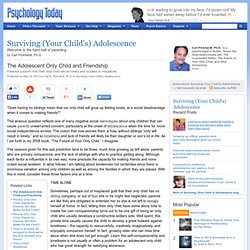
This anxious question reflects one of many negative social stereotypes about only children that can cause parents unwarranted concern, particularly at the onset of adolescence when the time for more social independence arrives. The notion that now worries them is how, without siblings “only will result in lonely,” and so loneliness and lack of friends will likely be their daughter or son’s lot in life. As I set forth in my 2008 book, “The Future of Your Only Child,” I disagree. The reasons given for this sad prediction tend to be three: much time growing up left alone; parents who are primary companions; and the lack of siblings with who to practice getting along.
Although each factor is influential in its own way, none preclude the capacity for making friends and none ordain social isolation. I welcome questions and suggestions for future blogs. Only Child Stereotypes: Fact Vs. Fiction. By Susan Newman, PhD You have to wonder why, when the U.S.

Census reports that the single child family is the fastest growing family unit, people tell you to have another child (or you think you should). Proponents of large or larger families claim your only child will be spoiled, lonely, or selfish or worse. These social stereotypes and others date back to the late 1890s and have no basis in fact and probably never did. The Dilemma of the Only Child. The adolescent only child. A type of family that has always interested me is the one with a single child.
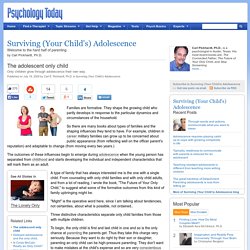
Why You and Your Siblings May Still Be Rivals. Every parent with more than one child knows about sibling rivalry.

Even if you’re not a parent, but are yourself a sibling, you’re almost certainly familiar with this experience. With more and more blended families as part of the relationship picture, step-siblings may also be in your life right now. We know from birth order research that children in a family take on a variety of roles that may or may not be linked to personality. For example, the oldest child may be the one to emulate most closely the parents and show leadership qualities as well as high needs for achievement. However, this isn’t always the case.
Birth Order, Sibling Sex Ratio, Handedness, and Sexual Orientation of Male and Female Participants in a BBC Internet Research Project. This study investigated the relations among sexual orientation, fraternal birth order (number of older brothers), and hand-preference.
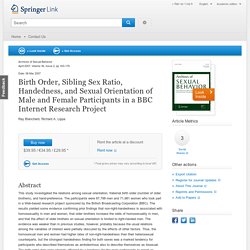
The participants were 87,798 men and 71,981 women who took part in a Web-based research project sponsored by the British Broadcasting Corporation (BBC). The results yielded some evidence confirming prior findings that non-right-handedness is associated with homosexuality in men and women, that older brothers increase the odds of homosexuality in men, and that the effect of older brothers on sexual orientation is limited to right-handed men. Birth Order, Sibling Competition, and Human Behavior. Sibling competition is widespread among bird and animal species and sometimes leads to siblicide.
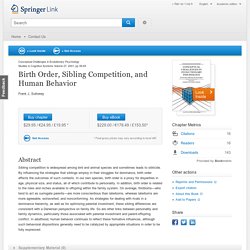
By influencing the strategies that siblings employ in their struggles for dominance, birth order affects the outcomes of such contests. In our own species, birth order is a proxy for disparities in age, physical size, and status, all of which contribute to personality. In addition, birth order is related to the roles and niches available to offspring within the family system. On average, firstborns—who tend to act as surrogate parents—are more conscientious than laterborns, whereas laterborns are more agreeable, extraverted, and nonconforming. As strategies for dealing with rivals in a dominance hierarchy, as well as for optimizing parental investment, these sibling differences are consistent with a Darwinian perspective on family life.
The Achiever, the Peacemaker and the Life of the Party: How Birth Order Affects Personality You’re going on a family road trip with your adult siblings.
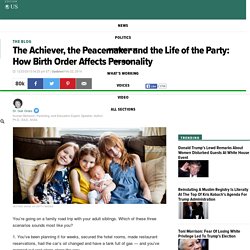
Which of these three scenarios sounds most like you? 1. You’ve been planning it for weeks, secured the hotel rooms, made restaurant reservations, had the car’s oil changed and have a tank full of gas — and you’ve mapped out rest stops along the way. 2. How Birth Order Affects Your Personality. WHEN I TELL PEOPLE I study whether birth order affects personality, I usually get blank looks.
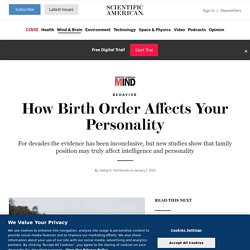
It sounds like studying whether the sky is blue. Isn’t it common sense? Alfred_Adler_-_Birth_Order.pdf. The birth order effect. The order we’re born in – first, middle or youngest child – is outside our control.
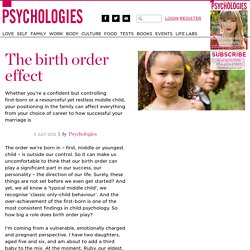
So it can make us uncomfortable to think that our birth order can play a significant part in our success, our personality – the direction of our life. Surely, these things are not set before we even get started? And yet, we all know a ‘typical middle child’, we recognise ‘classic only-child behaviour’. The birth order effect. Birth Order and Personality. Quick! Tell me what order you are in the family and what that means to you. Were you the youngest, the baby, who was taken care of, protected (perhaps spoiled) and not left to make your own decisions? Were you the oldest, who had all the pressure and demands placed on you to “set an example?” Or were you a middle, or lost child, who kind of fell through the cracks? You weren’t really special on either end of the spectrum, were you? Some experts believe that birth order is an important tool in shaping how you turn out as an adult. It’s not a conscious decision, this. Psychiatrist Alfred Adler (1870-1937) first proposed a theory on the effect of birth order on personality.
Is Birth Order Destiny? ALFRED ADLER, 1870–1937. A CRITICAL APPRECIATION - COLLINS - 2011 - British Journal of Educational Psychology. Birth Order - Psychology - Oxford Bibliographies. Birth Order - Psychology - Oxford Bibliographies. Alfred_Adler_-_Birth_Order.pdf. Alfred_Adler_-_Birth_Order.pdf. Alfred_Adler_-_Birth_Order.pdf. Alfred_Adler_-_Birth_Order.pdf. The Achiever, the Peacemaker and the Life of the Party: How Birth Order Affects Personality